The Comic Commish: The Previous Generation (Jan-Jun 2011)
By Mento 1 Comments
Welcome everyone to the newest Comic Commish, my monthly thank you to user @omghisam who was kind enough to pay for my Gold membership. I alluded to this briefly last time, but we're now entering the period of time when I began blogging on Giant Bomb on a regular weekly basis, and had gotten into the habit of illustrating my adventures with any games I happened to be playing during those seven day periods. These days I generally reserve my MS Paint shenanigans to this monthly series, but I must've made hundreds back in 2011 and 2012. As a result, we're going to start seeing a lot more games in the "Revisited" section as we count down the last four episodes of this feature. Like a lot more. I might even have to start curating it, heaven forfend.
June's Comic Commish covers the first half of 2011. The most significant video game event of this period is the launch of the Nintendo 3DS in February (Japan) and March (Europe and US). It had a rough start, but like its predecessor the DS it managed to rise above its gimmick and course-correct itself quickly enough, and can currently boast the most diverse and interesting library of exclusives of any current gen console. The considerable competition from the PlayStation Vita and iOS/Android mobile devices continues to keep it on its toes.
You're About to Read Some Guy's Opinions on Twenty Video Games. Congratulations, in a Way.
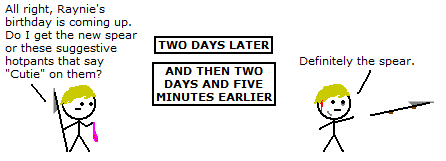
It took a while before I managed to convince myself to go through the trouble of importing Atlus's Radiant Historia from the States last year, and I'm very glad I did. Everything about this game is top-notch: the grid-based tactical combat system; the time-looping non-linear story; the various catastrophic dead-ends written to accommodate poor decisions; the morally-conflicted protagonist, Stocke; the violin-heavy soundtrack from Yoko Shimomura; a variable level of challenge that is ready to punish you should you ever let your guard down (these are the same folk behind SMT: Nocturne, after all) and an overall presentation that, despite concerning the fate of the entire world, seems more intimate and more invested in its cast. Many of the side-line plots concern secondary characters, with false endings that range from settling down with one party member to being murdered by another after you coldly betray their trust. The way some of these bad endings take place years later, though can still be fixed through Stocke's time-travelling gift, means the writers can have fun going off on all sorts of tangents. People often use "Choose Your Own Adventure book" derisively when discussing games full of potentially deadly dilemmas, but the writing and tone of Radiant Historia really makes it worth exploring the repercussions of every clearly calamitous decision.
The game's not perfect, of course. There's far too much repetition early on, as you'll grow less and less fond of having to once again pass through the Gran Plains region that separates the main city Alistel from the rest of the world, and several of the more interesting characters are underutilized because they simply don't appear until much later into the game, or are unavailable on one of the two core story branches. That there is only one significant split in the story is a little disappointing too, but then the sort of migraine-inducing timeline flowchart that would result from multiple decisions might be a little too much to navigate otherwise. It's a game that uses its combat, characters and central time-travelling gimmick very cleverly and, for as much I love JRPGs, clever isn't often a trait one can sincerely attribute to them.
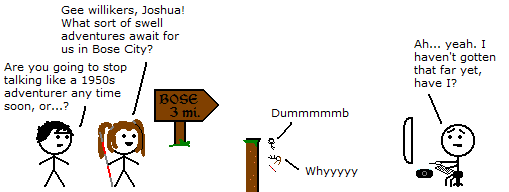
I'm actually still in the process of playing Trails in the Sky, so its inclusion here may be a bit premature. The Legend of Heroes series has an interesting history: the first five games were created for NEC PC platforms, with the first two for the PC-8801 and the subsequent three for the PC-9801. While it doesn't quite line up precisely, the PC-8801 could be considered early 8-bit DOS (maybe throw in the Commodore 64) while the many upgrades of the PC-9801 carried it from a 16-bit PC to a fully CD-ROM compatible Windows 95-tier system -- so, say, starting with the Atari ST and Amiga or 16-bit consoles like the SNES and Genesis and going all the way up to Saturn and PlayStation and beyond. For a bit more detail, since I've digressed enough already, check out Hardcore Gaming 101's enlightening breakdown on Japanese home computers.
The purpose of this little history lesson is to set up the fact that The Legends of Heroes is a very traditional turn-based JRPG series, one that has persisted to this day because Falcom is the sort of company that respects and caters to its fanbase's old-school wishes, and will presumably continue to do so. Compare this with Square-Enix, who have only just realised that their core appeal lies the type of game that might be considered "Classic Square", like Bravely Default, and have pledged to create more games with that sensibility moving forward. Trails in the Sky, the sixth core Legend of Heroes game, evolves the formula a little, but is content to simply be a well-written RPG with a bit of a tactical streak that otherwise does very little to divert from a format established in the 8-bit/16-bit heyday. It's a game for people who enjoy the older style of JRPG, without feeling too backwards or too basic in the process.
One welcome addition to Trails in the Sky has been the inclusion of the Bracer Guild. Though from all appearances a sidequest distribution service, there's some degree of varied nuance in the tasks it requests of players, and there's a lot of benefits to be had from running around and solving everyone's troubles. What's also remarkable, and may well end up quashing any chance of the third chapter being localized, is the sheer amount of text in the game. Characters converse deeply and often, many minor characters will change their dialogue after each major story event, and for a game that's simply the first part of a trilogy that makes up Legend of Heroes VI as a whole, there's quite a bit of meaty gameplay to get through. This first chapter also has the uneviable job of setting everything up, from the complex central relationship between optimistic ditz Estelle Bright and her mysterious stepbrother Joshua, to the mythology and geography (both political and literal) of the Liberl Kingdom, its regions and its antagonistic neighbors. A game that plays (and looks) like a PS1 game released in 2011 might sound like a hard sell, but there's a lot to be said for focusing on what matters in the genre you're representing, forsaking expensive graphics and elaborate gimmicks in the process.
But hey, here's that disclaimer again: I've still got a ways to go before I'm done with this one. It might get a whole lot better or a whole lot worse, but give or take a few big twists in the story I don't suspect that I'll walk away feeling much different about it.

Valve had their work cut out for them in following 2007's surprise hit Portal with a sequel that could be bigger and better, and it was fair to be skeptical about just how well the original's game sparse few hours of near-perfect gameplay could be stretched out to fill a much longer game without incurring diminishing returns or repetitious puzzle set-ups. Also problematic was taking the neatly tied-up arc between the calmly menacing GlaDOS and the mute and resourceful Chell and untying it for a sake of a much longer narrative that goes into far more detail about their backstories and that of the mysterious Aperture Science facility.
While I won't say that it handled every new element perfectly, Portal 2 is everything one could feasibly expect from a good Portal sequel. It does expand on the world's history in a meaningful and intriguing way. It is enhanced by the inclusion of new characters like the scatter-brained Wheatley and the absurdly prideful and irrational Aperture CEO Cave Johnson. It does create several new gameplay features congruous to the sort of mad science Aperture might have otherwise concocted alongside their Handheld Portal Device, like the momentum- and jump-boosting paints. It absolutely creates a terrifying new nemesis in the leopard print Animal King. Though the fears many of us had about the game's pacing issues and reiterative puzzles were substantiated to an extent, the game does succeed more often than it fails.
Revisited

Ghost Trick: Phantom Detective is (still) the newest IP from Shu Takumi, creator of the Ace Attorney games, and like those games Ghost Trick balances the levity of life with the morbidity of murder with a surprising amount of deftness. The pointy-haired protagonist Sissel finds himself deceased after the game's opening, and does everything he can to help others avoid a similar fate. Well, more like they die anyway and he helps them reverse it, via the time-travelling powers all ghosts have. It's a very convoluted set-up (that does eventually get explained, somewhat), and opens the way for some ingenious poltergeist possession puzzles that are contingent on some precise timing, as the player watches and plays back a brief scene again and again in order to find a way to redirect the outcome, diverting its usually fatal conclusion towards a more palatable outcome.
Takumi may have created a new world with new rules, but he still brings over a lot of his old habits: completely bizarre tertiary characters; a knack for goofy running gags; some colorful cartoony visuals with some truly outstanding rotoscoped animations; and the occasional mood shift towards the touching and melodramatic. Sometimes I wonder if the best Japanese games of the last decade haven't all been the result of a handful of auteurs like Takumi (or Shigeru Miyamoto, or Koji Igarashi, or Keiji Inafune, or Hideki Kamiya, or Keita Takahashi, or Shinji Mikami...), and whether or not I actually have a problem with that.

I must admit that I'd only known about Jellyvision's irreverent pop culture quiz game You Don't Know Jack tangentially for many years, due to not being a big PC gamer in the CD-ROM era nor having easy access to a predominantly American institution. Giant Bomb, has it has done for many fantastic games, introduced me to its madcap charms with their hilarious Quick Look of this 2011 reboot. Since then, I've been trying to play it in any legal means that I can, whether it's the truncated Facebook version or the recently released 90s compilation on Steam.
There's not a whole lot to say about the mechanics of You Don't Know Jack beyond "you answer trivia questions and try to outscore your opponents", insomuch as most of the actually remarkable stuff can only be sufficiently conveyed by playing it firsthand. Like how many general knowledge questions are answered in the most digressive roundabout way possible, or the running gag of the producer starting each "TV show" with a string of malapropisms, or host Cookie Masterson's vaguely sociopathic anecdotes, or the many strange and wonderfully named bonus rounds with their own special rules. The truth is, I've seen about as much of the core game as anyone else who has watched that Quick Look (the 2011 game is still not available here, though many of its questions ended up in the Facebook game), but can still heartily recommend it. Given how often Giant Bomb has championed it themselves, I feel like I'm probably preaching to the choir here anyway.

It's an odd coincidence, but as soon as the Splatoon trailer began during E3's Nintendo conference (sorry, "Digital Event") I and a great many of my fellow users in the Giant Bomb chat (and, if I recall, at least one of the Bomb Crew commentating over the event) assumed it was some sort of continuation of the De Blob series. A game that is unashamedly about having fun in a brightly colored world in lieu of anything particularly cinematic or narratively complex, De Blob 2 has your titular amorphous entity coloring himself different hues and spreading those pigmentation to the local environment in order to thwart a cabal of monochromatic spoilsports. It was vaguely open-world but not really, vaguely a platformer and a shooter but not a particularly involved variant of either. It was accessible, it was visually striking and it was fun, and that's all it really intended to be. Given the amount of positive feedback I've seen Nintendo receive from their E3 showing filled with likewise colorful and fun games, it's a fairly compelling case for a developer to make.

Jane Jensen became the next important female figure in adventure gaming after pioneer Roberta Williams with her Gabriel Knight series, about a lazy and irritable writer who frequently found himself embroiled in supernatural cases in part due to him being the latest in a long line of "schattenjagers"; Shadow Hunters, those that pursue and defeat the mythical creatures of the night. Gray Matter is her long overdue return to adventure games (as a writer, anyway, as she's worked on several interstitial games as a designer and director) after the third Gabriel Knight, Blood of the Sacred Blood of the Damned, crashed and burned due to being mired in the worst excesses of the FMV generation of graphic adventure games. Instead of fancy effects or digitized actors, Gray Matter goes back to 3D models and a relatively down-to-earth tale about fledgling magician Samantha Everett and her new employer Dr David Styles, a brilliant and reclusive neurobiologist who became obsessed with the afterlife after his beloved wife passed away.
Set in the picturesque university town of Oxford, England, the game splits its time between Samantha and David, exploring their very different backstories and present motivations, occasionally touching on their initially terse but burgeoning mentor/pupil relationship that progresses as the game's story unfolds. Many of Samantha's missions involve discovering a means to join a very exclusive circle of local magicians, while David's missions are more concerned with his research pertaining to various myths about ghosts and "clinging on" in an attempt to contact wayward spirits via their tenuous connections to the physical world. Like many adventure games, the key is in the quality of the writing and the puzzles, and Gray Matter doesn't disappoint in either regard. At the same time it can be a little too slow-paced and dour for its own good.

Outland takes a polarity-switching gimmick usually reserved for shooters like Silhouette Mirage and Ikaruga and uses it to frame its vaguely SpaceWhipper platformer. As if to homage its spiritual forebear, many of the enemies in the game attack with bullet hell style waves of projectiles, which the player has to either avoid or switch polarities in order to render them inert. Switching polarities also creates new paths while removing old ones, forging a parallel with Metroid Prime 2's light and dark worlds (or Guacamelee's land of the living/land of the dead, another Indie SpaceWhipper which perhaps owes quite a bit to Outland). Outland's a relatively uncomplicated SpaceWhipper beyond the palette switching, and looks incredible due to its stark use of bold color and dark shades.
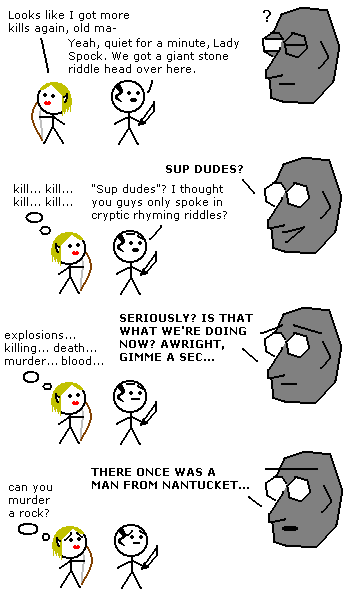
I created a comic for Hunted: The Demon's Forge, but I'm not entirely sure I can recommend it. This is what I meant by "curating the Revisited section" at the offset. Hunted does its best to convert the Gears of War system of cover and arenas to a fantasy world of elves and orcs, creating little set-piece battles in each new area between the two squabbling protagonists and a veritable horde of green-skinned monsters, but that only means it falls into the same traps of repetition and overwrought, action movie silliness. Replacing guns with bows and lancers with swords isn't sufficient, and the game suffers from lacking GoW's budget (far less spectacle, for one thing). You might presuppose that there is no clever or unique means to recreate Gears of War in a fantasy universe, at least in a way that doesn't just feel like a fantasy paint job, but The Last Story proved it could be done (quiet, VGK). It just required a bit more imagination than this, and possibly fewer tribal tattoos and nu-metal tracks.

I'm eagerly anticipating the next Witcher game, due to be released early next year, and it's largely due to its immediate predecessor The Witcher 2: Assassin of Kings. Fantasy universes are hard to do right these days, because the temptation is to lean hard into Tolkien territory like so many games before and draw from the strength of Tolkien's worldbuilding by retaining almost all the same elements and simply switching the names of locations around to avoid the lawyers. To create a believable and entirely disparate fantasy universe takes a considerable amount of effort and skill, and it's to the Witcher's benefit that it has a fairly well-regarded series of novels to draw its characters and world from. The writing in the Witcher games is sharp, its combat is layered and asks that the player use every trick in the book to succeed (like a late-game Baldur's Gate 2 fight, or absolutely any fight in Troika's Temple of Elemental Evil), its scenarios can be absurdly grim at times and it's all Geralt and Dandelion can do but to quip about how messed up everything is. Witcher 2 in particular had some strong graphical chops and a lot of free open-world shenanigans, and it looks like the sequel will wisely double down on both of those aspects.
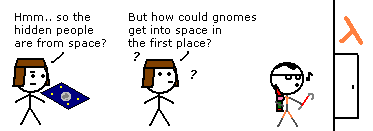
Puzzle Agent 2 follows the further adventures of Nelson Tethers where the previous left off, revisiting the adorable little factory town of Scoggins, MN in an overarching plot that borrows elements of Fargo, Twin Peaks and the Twilight Zone to spin a bizarre narrative about mysterious gnome-like creatures that is held together by a series of Layton-esque brainteasers. The puzzles are fun enough, but the draw is Graham Annable's world of dubious characters, frequently switching from the muted greys and browns of a strait-laced FBI agent on a mission concerning an eraser production facility in a sleepy little burg in the mountains, to the brightly-colored and maniacally animated absurd flights of fancy that the put-upon Tethers finds himself involved in. The sequel does sort of require that the player first acquaint themselves with the original game, as much of its continuing story is dependent on previous knowledge, but it's still every bit as fun (and brief, alas).
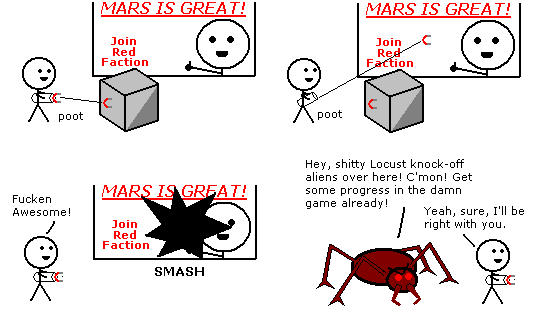
Like Hunted: Demon's Forge, Red Faction: Armageddon isn't a game I'm quick to recommend to anyone. It took the best feature of the open-world Red Faction: Guerrilla and transplanted it into a generic third-person sci-fi shooter complete with hordes of pointy aliens to shoot down and a very linear path to follow. The new ability to fix broken areas is less motivated by throwing something new into the mix than it is a means to undo the player's path of destruction should it happen to include taking out the one path needed to get to the next area. It does see a few imaginative uses, such as fixing bridges during a protracted sequence where the player escorts some soldiers and their trucks, but most of the time it's only really used to fix the destructible steel walkway you just tossed an alien into so you can walk over it to where the arrow wants you to go next. Besides the atrocious writing, it's an all-right TPS if you're into those. Just a significant bummer after the excellent game that was Red Faction: Guerrilla.
The Others!
- Dead Space 2 (Visceral, MUL, January '11): I remember being quite harsh on what I perceived was the downward trajectory that Dead Space 2 was taking the franchise towards when I initially blogged about it, but I suppose I was still way wide of the marker given the vitriol surrounding Dead Space 3. Regardless of any early warning signs, Dead Space 2 is a fantastic game that takes the Alien/Aliens sequel route of choosing to emphasize gory action over lonely, claustrophobic scares, but still stands on its own as an equally quality product via a completely different set of criteria. Well, maybe the gap isn't so pronounced in Dead Space's case, because the actual gameplay is fairly identical save for a few welcome improvements and tweaks. Some might say that Dead Space 2 is where the series lost its way, with the narrative focusing too much on including all the extracurricular animated movies and light gun games leading to that lackluster sequel. Others might say it's the series peak, with everything only going downhill afterwards. All I can say with any certainty is that I never want to go through that eye surgery sequence ever again.
- Venetica (Deck13 Interactive, PC/360/PS3, January '11): I believe I've talked about the phenomenon of "European jank" before now; that intrinsic shoddy quality that seems to embody most games made in mainland Europe (France excepted, since they have a better game industry than even the UK does) yet somehow does nothing to diminish their charm and, frequently, the breath of fresh air of creativity that tends to follow them. Metro 2033, STALKER, Mount and Blade, Serious Sam, Hard Reset, EYE: Divine Cybermancy and way more Steam titles than I can even recall have all felt like unpolished, vaguely broken computer games that nonetheless carry the torch for the weird, the unmarketable and the archaic. Venetica's an CRPG in this style, with Kingdoms of Amalur action combat and a completely nuts story about the mortal daughter of Death going on a rampage to avenge her fallen beau across a fictionalized Venice. It has Gothic's fingerprints all over it, but it's an interesting if not always particularly well-made slice of European oddness.
- Avadon: The Black Fortress (Spiderweb Software, PC, February '11): That isn't to say that the Americans can't produce RPGs that felt like they ought to have been made two decades ago either, which is probably the least kind way to put that Avadon, like much of Spiderweb's output, is a very deliberate throwback to the tactical RPGs of the early home computer age. For those of us who grew up with Ultima or the Gold Box or, heck, Wizardry, Spiderweb has been the best source of new blood for a relatively desiccated sub-genre of strategic CRPG. It's also quite substantial, having not been split up into multiple chapters like the majority of Spiderweb's RPGs (such as Geneforge or Avernum).
- Gemini Rue (Wadjet Eye, PC, February '11): Dammit, I knew I forgot to go back and finish something. Gimme another week, okay? I'm good for it.
- Mortal Kombat (Netherrealm Studios, Multi, April '11): I'm not one for fighting games at all. Too much training is required to understand and appreciate any given fighter game fully, which in slightly less fair terms means doing the same thing over and over and finding out your reaction speed isn't actually all that any more. Mortal Kombat doesn't really require that you go to that length to appreciate it however, because a lot of its charms are in its macabre sense of humor, its easy to pick up mechanics (but still challenging to master, one can only presume), its unusually strong single-player narrative and the violent and creative fun of its challenge tower. I suck at it, naturally, but then I sucked at Mortal Kombat 2 and 3 and still liked those quite a bit. I feel like it's rare to have a game so focused towards catering to its own fans like this yet can also be so accessible to newcomers at the same time. That kind of multi-tasking is usually reserved for games like Super Smash Bros which, I'm sure many will tell me, is not a fighting game and is therefore incomparable.
- Terraria (Re-Logic, PC, May '11): Never boarded the Minecraft bandwagon. I can acknowledge its appeal readily enough, as I was as obsessed with Lego as a child as anyone else, but having a completely directionless and ugly world of cuboid exploding cacti didn't appeal too much on a personal level. I'll admit that I was also somewhat dissuaded after hearing about the level of timesink it can become, especially for a completionist like myself who want to see and find and pick up everything. Terraria, despite not looking that much better, addressed what I considered to be my number one barrier to getting into Minecraft, which is to constantly have goals to chase and, most importantly of all, an "ending" of sorts where one can happily switch off the game once the strongest monster had been defeated and the best equipment had been found. Maybe Minecraft has those too, but it's never been a clear selling point. Of course, I did end up sinking a considerable number of hours into Terraria (Steam suggests it's close to 60 hours), and new updates continue to move the goalposts ever further away, but by that point it was already too late for me. Give me a pickaxe and some torches and I'm ready to go digging when you are.
- Alice: Madness Returns (Spicy House, PC/360/PS3, June '11): The sequel to the strange PC game American McGee's Alice, based on the already purposefully abstruse Alice in Wonderland novels, once again misses the point by trying to make Alice in Wonderland weirder than it already is. I guess having a Disney version of the book made it far too palatable and tame for some, and so adding harrowing scenes from a Victorian London sanitarium and oodles of colorful violence and grim mechanical steampunk flourishes was the only way to recreate the level of subversiveness for a new generation (hey, worked for Return to Oz). Maybe I'm reading into it too much. For all its silliness, Alice: Madness Returns is an eclectic mix of character action, platformer and adventure game with a considerable amount of imagination under its top hat. Were it a little more amusing, I might even make a Psychonauts comparison. It certainly delves into psychological trauma just as frequently.
- Shadows of the Damned (Grasshopper, 360/PS3, June '11): I've slowly been getting more and more enervated by each subsequent release from the eccentric Goichi "Suda 51" Suda, to the point where I'm not sure I ever intend to play Killer is Dead. Shadows of the Damned can be an exercise in eyerolling frustration, either with the game's action or the game's script, but for the most part is a reasonably solid Resident Evil 4 third-person shooter with some trippy visuals. Just... I dunno, you might want to try patiently working through the "giant boner" turret sequence as quickly as possible to enjoy the rest of it.
All right, I'm beat. Thanks for stopping by, and get ready for even more next month. My aching fingers...
